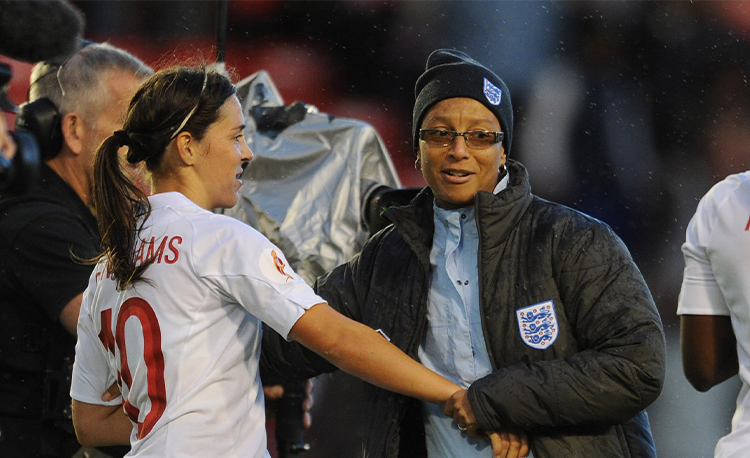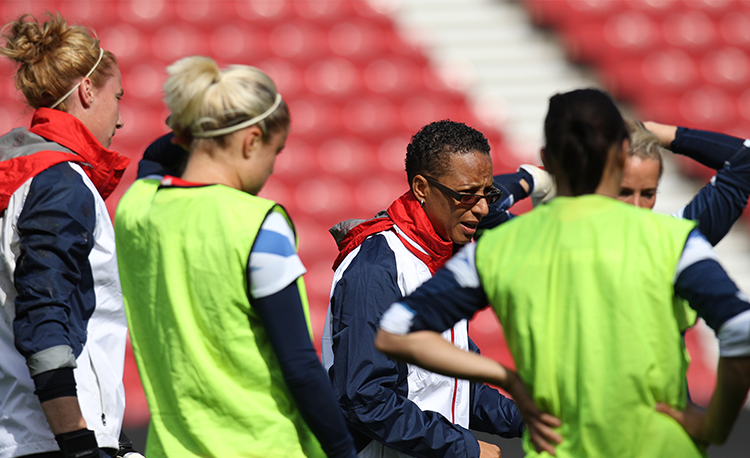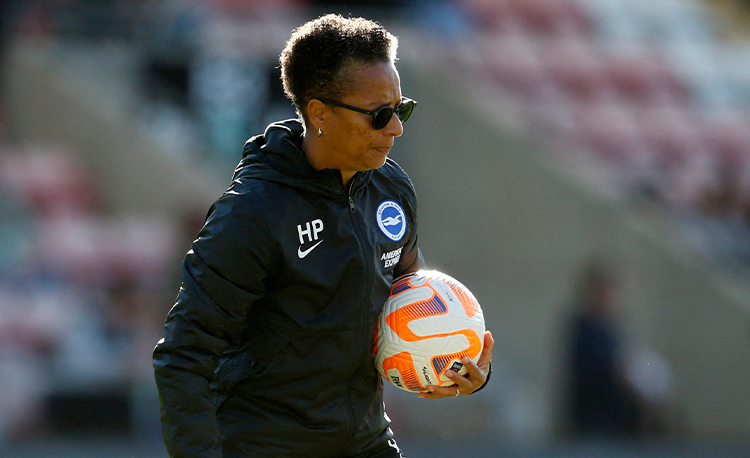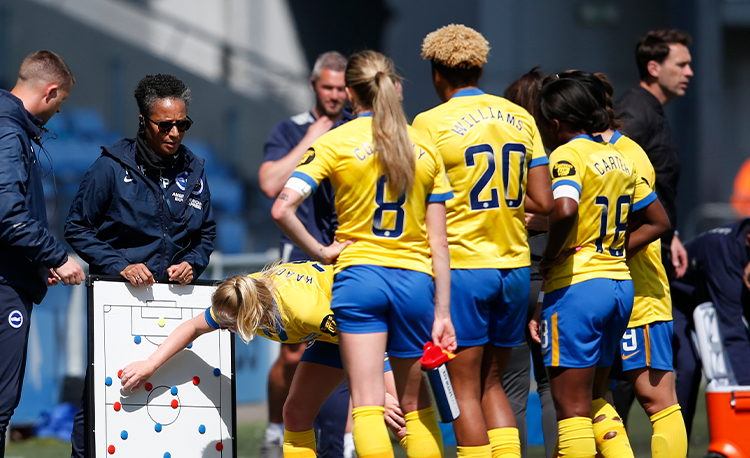You are viewing 1 of your 1 free articles
Hope Powell: The highlights of her journey
Few people have been so integral to the development of the women’s game in England as LMA Committee Member Hope Powell CBE, nor witnessed its growth at such quarters. Now women’s technical director at Birmingham City, Powell shares some of the highlights of her incredible journey
When Hope Powell was appointed head coach of England Women in 1998, she became not only the first person to hold the role full-time, but also the youngest coach ever to take charge of an England side. What’s more, her responsibilities didn’t end with managing the first team.
A former England international herself, she was tasked with overseeing the whole women’s youth structure, and establishing a coach mentoring scheme and the National Player Development Centre at the University of Loughborough.
It was to be a hugely successful and influential tenure, not only in terms of what Powell achieved on the pitch – leading the England Women to four UEFA Championships, the Euro 2009 final and two World Cup quarter-finals - but in the foundations that she helped lay for the women’s game we see today.
Powell is rightly proud of everything she achieved with England during that period, but says that off the pitch by far the biggest deal was winning the fight for players’ central contracts.
‘’Players were finally able to work part-time, rather than fitting training in around full-time jobs, and while it wasn’t a lot of money at the time, it was a huge turning point in the game,” she says. ‘’To see players today with full-time professional contracts is fantastic.”
LEADING THE WAY
While leadership creeps up on some people, for Powell it was a journey she embarked on at an early age. During her 20-year playing career, she passed The FA’s preliminary coaching award, obtained her UEFA B Licence and completed The FA’s female coach mentoring scheme. She was proactive, too, in taking on the role of development officer for Lewisham Borough Council and Crystal Palace FC’s community outreach scheme, and in acting as a volunteer coach at soccer camps in the US.
"I was also captain of my team and vice-captain of the England side, so I was in leadership roles early on,” she says. Asked whether she has changed her style since then, she says it’s more a question of maturing and growing.
"You refine your skills, change and adapt, shaping what you do next based on your previous experiences. What’s more, it’s a continuous journey, and every day is about working to ensure that next time you face something similar, you’ll do better. You’re asking constantly what it is you need to do to be better next year, what you need to focus on. So leadership for me is a continuous journey of learning.”
While Powell strives to develop and grow, there are some ways in which she is adamant that she will never change, certain non-negotiables. ‘’Principally, I will never compromise myself and my beliefs,” she says. ‘’This is who I am and these are my expectations, and I will never sell myself short just to please someone or curry favour. I’ll never compromise who I am as a human being.’’
Related Files
GROUNDWORK
Powell is currently applying her uncompromising high standards as women’s technical director at Birmingham City, where she is responsible for managing and building the women’s side of the club.
‘’We’re aiming high. That includes getting to the WSL and staying there, and reaching the Women’s Champions League,” she says.
Powell’s experience with England and her five years building the women’s game at Brighton and Hove Albion made her the ideal candidate to help take Birmingham City forward.
Before she could start making changes, however, her priority on joining in July 2023 was to really understand the status quo. ‘’That’s always the starting point,” she says, ‘’to observe, see what’s going on and what’s in place. It’s important to get to know the staff and understand them as people, their drivers and ambitions. Since I arrived, I’ve really got to know the climate I’m working in, the culture and the fundamentals of the organisation. From there, you can start to unpick things: for example, where staff might need to be upskilled or supported, trying to get some historical data so we can evidence proof, and then starting to put in place processes to improve how effective and efficient we are.”
Realising the club’s ambitious vision for the future is a big job that will take time to realise, but it’s one that Powell is relishing. That vision includes developing the player pathway, in part by extending its academy programme for girls, and engaging even more actively with the diverse local community.
"There’s such a strong community feel in Birmingham and we want to be really visible and to reach out to it. We want as many people as possible to fall in love with the game and be part of the football club,” she says, "because you get so much from being part of something.” That includes the players, who Powell says are keen to get out there into the community, to promote themselves, the club and women’s football.
"It’s genuinely important to them,” she says. ‘’In fact, it’s a real feel-good factor for all of us.”
FRONT AND CENTRE
As a mark of the level of respect that Powell has garnered in the women’s game, she was invited to be part of a government-commissioned independent review of women’s football last year. Chaired by former Lionesses midfielder Karen Carney OBE, the review examined issues affecting the women’s game at elite and grassroots levels in England, with a series of strategic recommendations released in July 2023.
While they are just that – recommendations – Powell is encouraged to see that certain points appear to be being taken seriously, among them a call for greater diversity in the game and recognition of the need to raise standards of practice for women in football. "Perhaps the most important outcome of reviews such as this, though, is that they get people talking,” says Powell.
"Often, it’s that conversation and debate that leads to positive action. Adding to the incredible achievements we’ve seen in recent years by the Lionesses, last year’s review has helped to, once again, put women’s football at the forefront of people’s minds.”
Powell believes that to raise women’s football to the next level and achieve greater parity with the men’s game we need continued investment and to maintain the momentum of recent decades. ‘’That means keeping the women’s game front and centre of everything and, of course, continuing to be successful on and off the pitch.”
MODEL BEHAVIOUR
For young girls entering the player pathway, and current players looking ahead to their future careers, strong role models will also be key. As Powell points out, there are now some really strong female leaders in women’s football, including Nikki Doucet, CEO of Women’s Professional Leagues, tasked with the women’s game into a new era. She hopes, however, to see a new generation of female leaders coming through. ‘’Those opportunities need to be made available and they need to be real,” she says, "because it’s important to have those female role models, at all levels of the game, and continue to break down the barriers.”
Powell, herself a pioneer in the industry, continues to add value and help her peers wherever she can, both in her current role and in the game more widely. Since becoming the first woman to be awarded the UEFA Pro Licence, she has always endeavoured to upskill herself and is currently completing The FA Technical Directors course, which she says has opened up a whole new sense of learning.
"I’m always happy to expose myself to things I don’t understand, things I want to explore,” she says. ‘’The game’s always developing and I need to make sure I move with it. It’s important also to be visible and to encourage and support the next generation of aspiring England managers or technical directors wherever I can. That can mean you spread yourself a bit thin, but I was fortunate to have a great mentor and lots of people who helped me throughout my career, so if I can pass on some words of wisdom then I’m more than happy to do that. Until I retire from this game, I’m still on a journey, and it will never be time to put my feet up. There’s still so much work to be done.”
Editor's Picks
Deep runs in the final third
Using the goalkeeper in build-up play
Pressing principles
Intensive boxes drill with goals
Penetrating the final third
Creating and finishing
My philosophy
Pressing initiation
Compact team movement
Coaches' Testimonials

Alan Pardew

Arsène Wenger

Brendan Rodgers

Carlos Carvalhal

José Mourinho

Jürgen Klopp

Pep Guardiola

Roy Hodgson

Sir Alex Ferguson

Steven Gerrard
Coaches' Testimonials

Gerald Kearney, Downtown Las Vegas Soccer Club

Paul Butler, Florida, USA

Rick Shields, Springboro, USA

Tony Green, Pierrefonds Titans, Quebec, Canada
Join the world's leading coaches and managers and discover for yourself one of the best kept secrets in coaching. No other training tool on the planet is written or read by the calibre of names you’ll find in Elite Soccer.
In a recent survey 92% of subscribers said Elite Soccer makes them more confident, 89% said it makes them a more effective coach and 91% said it makes them more inspired.
Get Monthly Inspiration
All the latest techniques and approaches
Since 2010 Elite Soccer has given subscribers exclusive insight into the training ground practices of the world’s best coaches. Published in partnership with the League Managers Association we have unparalleled access to the leading lights in the English leagues, as well as a host of international managers.
Elite Soccer exclusively features sessions written by the coaches themselves. There are no observed sessions and no sessions “in the style of”, just first-hand advice delivered direct to you from the coach.









